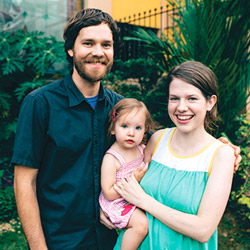Arts & Culture Faithful Creativity
Healing Arts
Alumni Develop Toolkit for Work With Trafficking Survivors
By Julia Siemens (julia2@spu.edu) | Photos by John Keatley

Attendees at the Arts Aftercare training in Manila, Philippines, hold up supplies from the Healing Arts Toolkit.
The notes of “Twinkle, Twinkle, Little Star,” reverberated softly from the lips of 2-year-old Harper Romjue. Her parents, Grace Damoff Romjue '05 and Curtis Romjue '03, listened to their toddler's song as they drove down a street cluttered with sex stores, bars, and neon signs. Middle-aged white men walked arm-in-arm with scantily clad pre-teens. The family was on Fields Avenue in Angeles, Philippines — one of the biggest sex tourism destinations in the world.
They had travelled from Seattle to train 24 staff from six nonprofit organizations in how to use the Healing Arts Toolkit, a resource for using music and the visual arts to help victims of sex trafficking begin to heal.
“There's nothing I want to see changed more than forced prostitution,” says Curtis. “There's nothing more violating and disrespectful. After having children, I see that even more.”
Curtis first heard that girls as young as 5 were being rescued from brothels when he was a student at Seattle Pacific University. Gary Haugen, founder of International Justice Mission, spoke in chapel, and Curtis felt compelled to do something.
That's why he started the nonprofit band Jubilee in 2004. With the motto “Do What You Love to Undo What You Hate,” the band has spent almost a decade raising awareness of human trafficking and funds for its victims.
 Curtis and Grace Romjue, pictured with
Curtis and Grace Romjue, pictured with
daughter Harper.
Through Jubilee, Curtis and Grace became justice advocates with IJM and began attending the organization's Global Prayer Gathering and training events.
Around the same time, Grace read a newsletter from a therapist working with former child soldiers in Uganda. The therapist met with a group of 8-year-old girls who wouldn't talk. But they would draw pictures of the atrocities they took part in. Eventually they could talk about the drawings, which led to breakthroughs.
“I just remember bawling as I read,” Grace says. “It was so tragic and beautiful. It was a story that was tucked away in our minds.”
The Romjues knew they wanted to use music and art to help children heal after they were rescued from brothels. The couple consulted 17 experts and hired a therapist to bring together best practices. They also partnered with graduate students at the Seattle School of Theology and Psychology, and plan to work with SPU music therapy students as well.
The result is Arts Aftercare, an organization founded to bring “beauty and healing through the arts” to human trafficking survivors at local and international safe homes. IJM is one of the project's official partners.
Arts Aftercare has developed the Healing Arts Toolkit, which has a training curriculum for care providers in safe homes, and 10 activities that are easy to replicate anywhere in the world. The kits contain instructions and objects, such as balloons, rubber bands, markers, and colored scarves.
“The activities in our toolkit provide a non-threatening way for trafficking survivors to enter gently into life in a safe home,” Curtis says. Participants begin to create community as they make and play instruments, draw, and participate in a drama together. Self-expression and relationship-building are the ultimate goals. All of Jubilee's profits go to Arts Aftercare. As more funding comes in, people in more countries will be trained with the Toolkit.
“I am so impressed,” says Carlene Brown, assistant professor of music and founder of SPU's Music Therapy Program. Brown, a member of the Arts Aftercare advisory board, appreciates that the Romjues have “thought about how to allow the arts to be a vehicle of expression, and not to hurt or cause any more damage.”
Curtis says that he will never forget what it was like to drive down Fields Avenue while Harper sat on his lap. But he also won't forget watching Harper sit on the lap of one of the 15-year-old girls who had been rescued from forced prostitution. The girl smiled and giggled as she helped Harper color.
“To see the joy on both their faces gave me a sense that there's nothing God can't redeem,” Curtis says. “We're made in his image, so we're resilient.”
